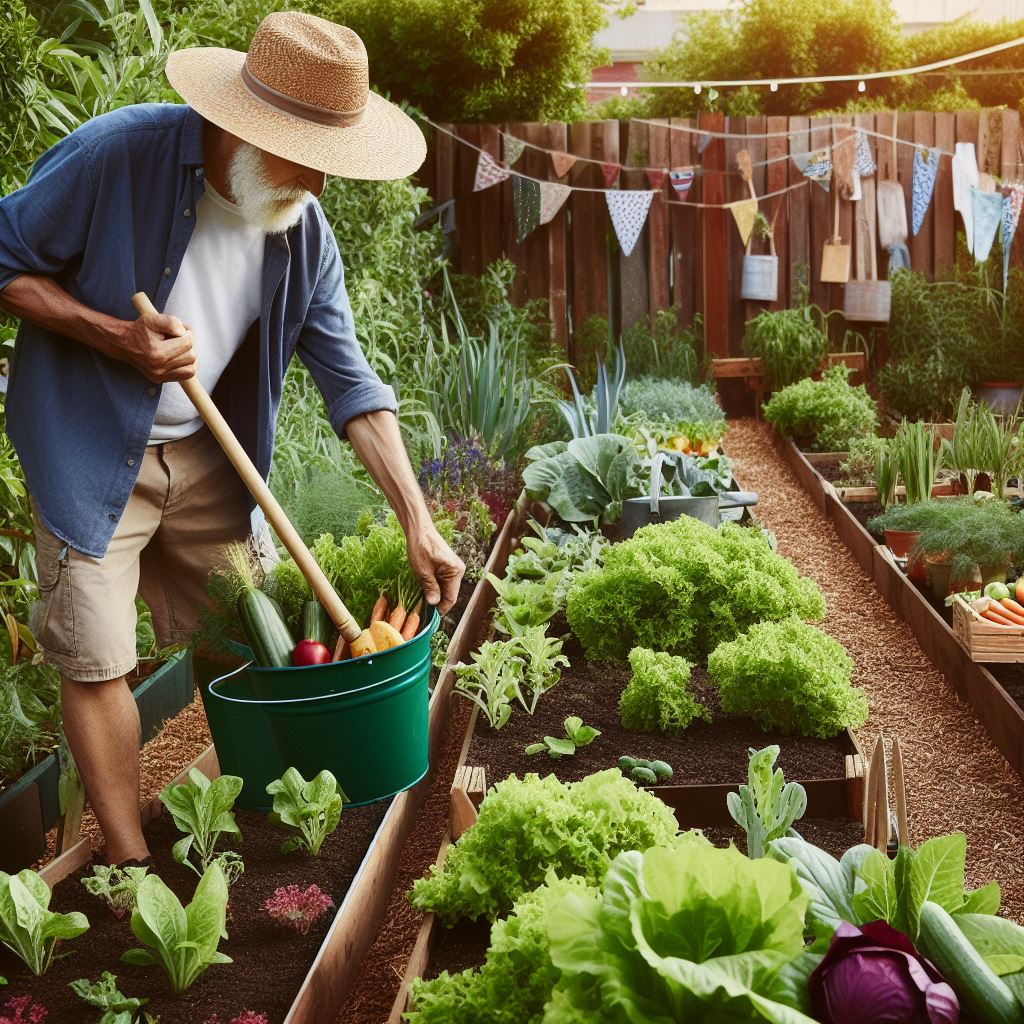Introduction
Urban organic farming is the practice of growing crops and producing food in urban areas, using organic methods.
Organic farming, in general, has been on the rise due to increasing concerns about food safety and environmental sustainability.
Definition of Urban Organic Farming
Urban organic farming involves cultivating crops and raising animals in urban settings, such as rooftops, balconies, and even abandoned buildings.
It prioritizes organic principles, excluding the use of synthetic fertilizers, pesticides, or genetically modified organisms.
Background on the Rise of Organic Farming in General
Over the past decades, organic farming has gained popularity worldwide.
Consumers’ growing interest in healthier food choices, free of chemical residues, and greater awareness of sustainable farming practices have contributed to this rise.
The demand for organically grown produce has increased significantly, leading to the development of urban organic farming.
As more people move to cities, there is a need to find innovative ways to produce fresh, nutritious food in limited spaces.
Urban organic farming has emerged as a response to the challenges of urbanization, aiming to provide communities with accessible and sustainable food sources.
It promotes vertical farming, hydroponics, and community gardening to optimize space utilization.
The benefits of urban organic farming are numerous.
Not only does it reduce transportation costs and emissions, but it also encourages healthier eating habits and reconnects urban dwellers with nature.
Additionally, it offers employment opportunities, promotes biodiversity, and enhances food security.
The rise of urban organic farming is a positive trend in sustainable agriculture.
As cities continue to grow, the need for local, organic food production becomes increasingly important.
Urban farming can contribute to healthier communities and a more sustainable future for all.
Reasons for the rise of urban organic farming
Urban organic farming has seen a significant rise in popularity in recent years.
There are several key factors contributing to this trend.
Increased awareness of health and environmental concerns
One of the main reasons for the rise of urban organic farming is the growing awareness of health and environmental concerns among city dwellers.
People are becoming more conscious of the harmful effects of conventional farming practices, such as the use of pesticides and genetically modified organisms (GMOs).
Urban organic farming offers an alternative method that focuses on natural and sustainable practices, which appeals to those seeking a healthier lifestyle and a reduced carbon footprint.
Desire for fresh, locally grown produce
Another factor driving the rise of urban organic farming is the desire for fresh, locally grown produce.
With the rise of industrial agriculture, the distance between food production and consumption has increased significantly.
As a result, fruits and vegetables often have to travel long distances before they reach consumers, resulting in a loss of freshness and nutrient quality.
Urban organic farming allows people to have access to freshly harvested produce right in their own neighborhoods, ensuring higher quality and better flavor.
Limited access to traditional farmland in urban areas
Limited access to traditional farmland in urban areas is also a significant factor behind the rise of urban organic farming.
As cities continue to expand, farmland is often converted into residential or commercial spaces.
This loss of farmland means that urban residents have limited opportunities to engage in agriculture.
However, the rise of urban organic farming provides a solution to this problem.
By utilizing rooftops, balconies, community gardens, and vacant lots, urban farmers can grow their own food in a limited space.
Desire for community engagement and connection
Urban organic farming offers a unique opportunity for community engagement and connection.
Creating community gardens and urban farms brings people together and fosters a sense of shared purpose and responsibility.
It provides a space for individuals to connect with nature, learn about food production, and exchange knowledge and skills.
This sense of community can enhance social cohesion and create a stronger sense of belonging among urban residents.
Economic benefits and local food security
The rise of urban organic farming also brings economic benefits and enhances local food security.
By growing food locally, urban farmers can reduce dependency on imported produce, which is often more expensive due to transportation costs.
Additionally, urban farming creates job opportunities and stimulates economic growth at a local level.
It also reduces the risk of food shortages during times of disruptions in the global food supply chain.
In conclusion, the rise of urban organic farming can be attributed to various reasons, including increased awareness of health and environmental concerns, the desire for fresh, locally grown produce, limited access to traditional farmland in urban areas, the desire for community engagement and connection, and the economic benefits and local food security it provides.
As more people recognize the importance of sustainable and healthy food production, urban organic farming is likely to continue its upward trend and play a vital role in shaping our urban landscapes.
Read: Seasonal Eating from Organic Farms
Transform Your Agribusiness
Unlock your farm's potential with expert advice tailored to your needs. Get actionable steps that drive real results.
Get StartedBenefits of Urban Organic Farming
Urban organic farming has gained significant popularity in recent years due to its various benefits.
In this chapter, we will explore some of these advantages:
Let’s delve deeper into each of these benefits:
- Reduction in greenhouse gas emissions due to reduced transportation: Traditional agricultural practices often require long-distance transportation of produce from rural areas to cities. This transportation process generates significant greenhouse gas emissions, which contribute to climate change. By cultivating food within cities through urban organic farming, the need for long transportation is minimized or eliminated. This, in turn, reduces carbon emissions and helps combat the adverse effects of climate change.
- Preservation of green spaces within cities: Urban areas are usually characterized by concrete jungles, with limited green spaces. However, urban organic farming allows for the creation of gardens, green rooftops, and vertical farms within the cityscape. These green spaces not only enhance the aesthetics but also contribute to improved air quality and biodiversity. Urban organic farms bring nature back into the city and create a healthier and more sustainable environment.
- Promotion of community engagement and social interaction: Urban organic farms serve as community hubs, bringing people together and fostering social interaction. They provide opportunities for individuals of all ages, backgrounds, and abilities to engage in farming activities, learn about sustainable practices, and connect with others who share similar interests. This sense of community encourages collaboration, empathy, and support among residents, ultimately strengthening the social fabric within urban neighborhoods.
Promotion of community engagement and social interaction
In addition to these primary benefits, urban organic farming offers various other advantages:
- Access to fresh and nutritious produce: By cultivating food locally, urban organic farms ensure a direct supply of fresh and nutrient-rich produce to city dwellers. This promotes healthier eating habits and reduces the reliance on processed and packaged foods.
- Enhanced food security: Urban organic farming contributes to food security by reducing the dependency on external food sources. By producing food within cities, communities become more resilient to potential disruptions in the global food supply chain.
- Education and skill development: Urban organic farms provide a platform for education and skill development, particularly in the areas of sustainable agriculture, food production, and environmental consciousness. They offer workshops, training programs, and volunteering opportunities to empower individuals with knowledge and practical skills.
- Economic opportunities: Urban organic farming has the potential to create employment opportunities and stimulate local economies. It can generate income through the sale of produce, farm-related services, and eco-tourism, contributing to the overall economic growth of the city.
- Improved health and well-being: Engaging in urban organic farming activities, such as gardening and farming, has been proven to have positive effects on mental and physical health. It offers stress relief, improves mindfulness, and encourages physical activity.
In conclusion, urban organic farming presents a multitude of benefits, ranging from reducing greenhouse gas emissions and preserving green spaces to promoting community engagement and social interaction.
By embracing this sustainable practice, cities can pave the way towards a greener, healthier, and more inclusive future.
Read: Artisan Cheeses: Pairing and Recipes

Challenges faced by urban organic farmers
Urban organic farmers face several challenges in their pursuit of sustainable agriculture amidst the concrete jungles.
These include limited space for cultivation, potential contamination from urban pollutants, and a lack of knowledge and experience among urban dwellers.
- Limited space for cultivation: One of the major challenges faced by urban organic farmers is the limited availability of space for cultivation. Urban areas are often characterized by high population density and limited open spaces. This poses a significant constraint for farmers who rely on land for growing organic crops.
- Potential contamination from urban pollutants: Urban areas are notorious for pollution, which can potentially contaminate organic crops. From air pollution caused by industries and vehicle emissions to soil pollution from toxic waste and chemicals, urban organic farmers must be vigilant about the potential hazards to their crops. This requires regular testing and monitoring to ensure the safety and quality of their produce.
- Lack of knowledge and experience among urban dwellers: Many urban dwellers have limited knowledge and experience when it comes to farming and agriculture. They may not fully understand the principles and practices of organic farming or the importance of supporting local farmers. This poses a challenge for urban organic farmers who strive to educate and engage with their community to promote sustainable food production.
Lack of knowledge and experience among urban dwellers
To mitigate these challenges, urban organic farmers employ various strategies and solutions:
- Vertical farming: Vertical farming is a technique that allows farmers to maximize limited space by growing crops in vertically stacked layers. This innovative approach makes use of vertical space, such as walls or specially designed structures, to cultivate a greater volume of produce.
- Rooftop gardening: Utilizing rooftops for organic farming is another solution to the limited space challenge. Rooftop gardens provide a viable option for urban organic farmers to grow crops without requiring additional land. These gardens also offer other benefits, such as mitigating heat island effects, improving air quality, and creating green spaces within urban environments.
- Soil remediation and testing: To address potential contamination from urban pollutants, farmers employ soil remediation techniques to clean contaminated soil or use raised beds with imported soil. Regular soil testing is also crucial to ensure the safety and quality of the crops.
- Community engagement and education: Urban organic farmers play a vital role in educating and engaging with the local community. They organize workshops, farm tours, and community activities to raise awareness about organic farming and its benefits. By bridging the knowledge gap, they empower urban dwellers to make informed choices and support sustainable agriculture.
- Collaboration and networking: Collaboration and networking among urban organic farmers can help overcome challenges collectively. By sharing resources, knowledge, and experiences, farmers can find innovative solutions and create a supportive community that fosters growth and resilience.
Despite the challenges, the rise of urban organic farming is a promising trend that offers numerous benefits, such as increased food security, reduced carbon footprint, and improved urban livability.
By embracing these challenges head-on, urban organic farmers are paving the way for a greener and more sustainable future in our cities.
Read: Fresh & Local: Amy’s Farming Journey
Innovative solutions in urban organic farming
In urban organic farming, innovative solutions are being implemented to overcome the challenges of limited space and resources.
One such solution is the establishment of rooftop gardens and vertical farming systems.
These alternatives allow farmers to utilize unused rooftop spaces for cultivating organic crops.
Rooftop gardens and vertical farming
Rooftop gardens are a sustainable way to grow organic produce in urban areas.
They make use of existing infrastructures, turning otherwise unused spaces into productive agricultural areas.
By utilizing rooftop spaces, urban farmers can maximize the use of their limited land resources.
Vertical farming is another innovative solution in urban organic farming.
It involves growing crops in vertically stacked layers, such as in tower gardens or vertical hydroponic systems.
This method increases the growing area without requiring additional land space.
By utilizing this technique, farmers can produce more organic crops in a smaller footprint.
Use of hydroponics and aquaponics systems
In addition to rooftop gardens and vertical farming, hydroponics and aquaponics systems are other effective solutions in urban organic farming.
Hydroponics is a soil-less method that uses nutrient-rich water to grow plants. It is a highly efficient technique that saves both water and space.
Aquaponics, on the other hand, combines hydroponics with aquaculture, creating a symbiotic system where plants and fish mutually benefit from each other’s waste products.
Collaboration between urban farmers and community organizations
Collaboration between urban farmers and community organizations is another key solution in urban organic farming.
By working together, farmers can share resources, expertise, and knowledge, leading to a more sustainable and productive urban farming community.
Community organizations can provide support through funding, educational programs, and networking opportunities, helping urban farmers thrive and contribute to their communities’ food security.
This collaboration also encourages the development of localized food systems, where urban farmers supply fresh organic produce directly to local markets, restaurants, and consumers.
This reduces the carbon footprint associated with transporting food over long distances and promotes a more sustainable and resilient urban food system.
Furthermore, innovative solutions in urban organic farming are not just limited to cultivation techniques but also extend to waste management and resource recycling.
Composting systems can be implemented to efficiently convert organic waste into nutrient-rich compost, which can then be used as fertilizer for urban farms.
This helps reduce waste and close the loop in the urban food production cycle.
In conclusion, urban organic farming faces unique challenges due to limited space and resources.
However, innovative solutions such as rooftop gardens, vertical farming, hydroponics, aquaponics, and collaboration between urban farmers and community organizations are being implemented to overcome these obstacles.
These solutions not only increase the productivity and efficiency of urban farming but also contribute to sustainable and resilient urban food systems.
With continued advancements and support, urban organic farming has the potential to revolutionize the way we grow and consume food in our cities.
Read: Eco Farming: Joe’s Green Techniques
Success stories in urban organic farming
Urban organic farming has gained traction worldwide, with numerous success stories highlighting the potential of this sustainable practice.
Through innovative initiatives and the dedication of individuals, urban areas are witnessing the rise of thriving organic farms.
Examples of thriving urban organic farms
- The Green City Farm in Chicago: This urban farm has transformed vacant lots into flourishing organic gardens, promoting local food production and community engagement.
- The Rooftop Farms in New York City: Utilizing unused rooftop spaces, these farms showcase the possibility of cultivating organic crops amidst a concrete jungle.
- The Farm Lot 59 in Long Beach: This small plot of land demonstrates the power of urban farming by supplying fresh, organic produce to local restaurants and farmers markets.
- The Growing Power in Milwaukee: With a mission to support sustainable food systems, this urban farm produces organic vegetables, raises livestock, and even operates an aquaponics system.
Initiatives promoting urban farming in major cities
- The Green Roof Initiative in Denver: This program encourages residents to convert rooftop spaces into green areas for urban farming, reducing the urban heat island effect and enhancing biodiversity.
- The Food Roof in St. Louis: By utilizing rooftop spaces, this initiative cultivates organic vegetables, herbs, and fruits, while also providing educational programs and engaging the local community.
- The City Farmer in Vancouver: This organization provides resources, workshops, and mentorship for individuals interested in starting their own urban farms, creating a network of urban agriculturalists.
- The Incredible Edible in Todmorden, UK: This community-led initiative transformed the town into an edible landscape, with communal gardens and fruit trees accessible to everyone.
These success stories and initiatives serve as inspiration for urban dwellers to embrace organic farming in their own communities.
By utilizing unused spaces and implementing sustainable practices, urban areas can become self-sufficient in terms of fresh produce and contribute to a healthier environment.
Urban organic farming provides numerous benefits, including the reduction of food miles, decreased dependency on harmful pesticides, and improved access to nutritious food in food deserts.
Additionally, these farms often act as educational platforms, teaching individuals about sustainable agriculture and strengthening their connection to nature.
By engaging individuals, local businesses, and government bodies, these initiatives can create a robust and resilient urban food system.
Increased collaboration and knowledge sharing will further enhance the growth of urban organic farming.
In conclusion, the success stories of urban organic farming highlight the potential for sustainable food production within cities.
Through the establishment of thriving urban farms and the promotion of initiatives, communities can work towards food security, environmental sustainability, and a stronger sense of community.
Embracing organic farming in urban areas is not only a trend but a necessary step towards a more sustainable future.
Conclusion
In conclusion, we have explored the rise of urban organic farming, a growing trend that has gained significant attention.
We have seen that more and more people are realizing the importance of sustainable food production in urban areas.
Through this chapter, we have learned about the benefits and challenges of urban organic farming, as well as the various methods used in this practice.
Recapping the rise of urban organic farming, we can see that it has provided numerous advantages.
It promotes healthy eating habits, reduces the carbon footprint, and creates a sense of community among urban dwellers.
Not to mention, by growing food locally, it also addresses issues of food security and fosters self-sufficiency.
Showcase Your Farming Business
Publish your professional farming services profile on our blog for a one-time fee of $200 and reach a dedicated audience of farmers and agribusiness owners.
Publish Your ProfileHowever, it is important to note that this trend still faces some obstacles.
Land availability, limited space, and potential soil contamination are some of the challenges that urban farmers have to overcome.
Yet, despite these challenges, urban organic farming continues to thrive, thanks to the dedication and passion of individuals involved.
Moving forward, it is crucial to encourage further exploration and support of this growing trend.
Governments, organizations, and communities should collaborate to provide resources, education, and incentives for urban farmers.
By doing so, we can ensure the sustainability and success of urban organic farming.
In conclusion, urban organic farming offers a promising solution to the increasing food demands of urban centers while promoting environmental sustainability.
Let us embrace this trend, support the farmers, and enjoy the fresh, nutritious produce grown right in our own cities.
Together, we can make a positive impact on our health and the planet.




